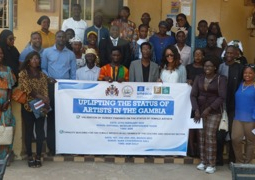
What began as a routine clarification quickly spiraled into a heated legal debate when former Janneh Commission Chairperson Suharata B.S. Janneh was asked to explain the Commission’s actions before it was formally constituted on 17 July 2017.
Janneh traced events back to a government suit filed at the High Court, where an injunction had been granted freezing virtually all of Jammeh’s assets vehicles, livestock, wildlife except for three companies later discovered by the Commission, including Dunes Hotel. To his mind, he said, the High Court order “needed to have been relaxed” before any asset could be sold.
He explained that the Commission did seek relaxation of the order for the cattle sale, but “neglected” to do so in the case of vehicles a decision he defended as the Commission acting within what it believed was its concurrent jurisdiction with the High Court.
Counsel challenged him sharply: “Are you saying that a Commission of Inquiry can set aside a ruling or an order of the High Court?”
“No,” Janneh replied, “and also the High Court cannot set aside the order of the Commission.”
Counsel countered that the Commission’s action had “the effect of varying” the High Court order. Janneh insisted that such a conclusion was only a deduction, not a formal legal act: “You are talking of effect. And I’m telling you the only person who can say that was wrong in law is the Court of Appeal.”
The exchange grew increasingly philosophical, with both sides acknowledging that the judiciary — and not the Commission nor the National Assembly — holds the ultimate authority on legal conflicts.
“We have a clash of views,” Janneh said plainly.
“Indeed,” counsel replied.
Janneh also highlighted the Commission’s struggles to secure the participation of former president Yahya Jammeh. He emphasized that Jammeh had been formally served in Equatorial Guinea and offered the chance to testify virtually, just as other witnesses had done.
“He did not,” Janneh said. “He was the only one who could have attacked us and gone to the Court of Appeal but that never happened.”
He noted that Jammeh had “thousands of people in The Gambia” and the financial means to file legal challenges on his behalf, but chose not to engage at all a sign, Janneh suggested, of “total contempt” for the process.
The legal debate soon shifted to the limits of the National Assembly’s powers. While Janneh warned that it was “dangerous” for a parliamentary committee to delve into jurisdictional matters, something he said properly belongs to the courts counsel stood firm.
“We advise the President on policy,” counsel said. “We are within our mandate to scrutinize every activity of the Executive, including the Commission of Inquiry.”
Janneh agreed that each arm of government has its role, repeating that only the courts can settle legal disputes of this nature. The two eventually accepted they had reached a “stalemate” as far as legal interpretation was concerned.
The session then shifted to one of the most sensitive episodes of the Commission: the petition filed in July 2018 by its own Secretary, Alhaji Mamadi Kurang. The petition, addressed to the Office of the President and copied to Janneh, accused Lead Counsel Amie Bensouda of interference in Commission orders, manipulating budgets, showing bias in witness selection, and lapses in professional judgment.
Counsel outlined the allegations one by one. Janneh asked to see the document himself, noting he could not recall every detail.
He directed the committee to page 29 of the Commission’s report, where the internal rift had been documented. He described a “clash in Chambers” between Kurang and Lead Counsel, triggered by inappropriate language and serious disagreements during private deliberations.
“It was aborted by the President of the Chamber and other officials,” Janneh recalled. Reconciliation efforts were made, but the fallout was severe.
Kurang’s letter to the President led to vigorous written exchanges, as Bensouda strongly refuted the accusations. The matter leaked to the media and quickly became public controversy.
The Commissioners waited for the President’s decision. “Within a few days,” Janneh said, “the Office of the President reacted by removing Kurang as Secretary to the Commission.”
Read Other Articles In Headlines




